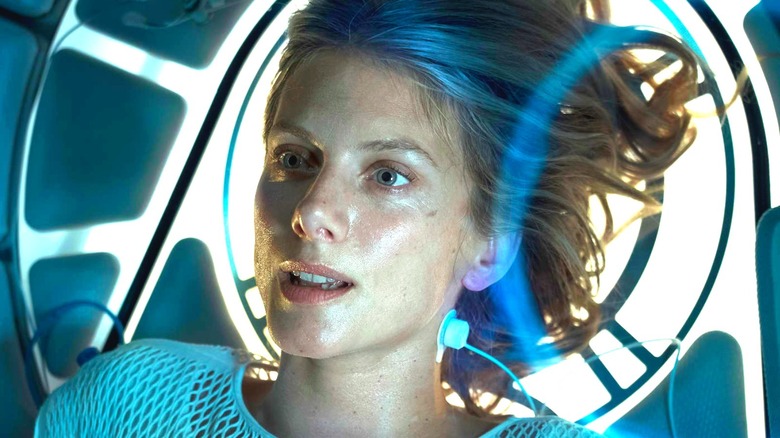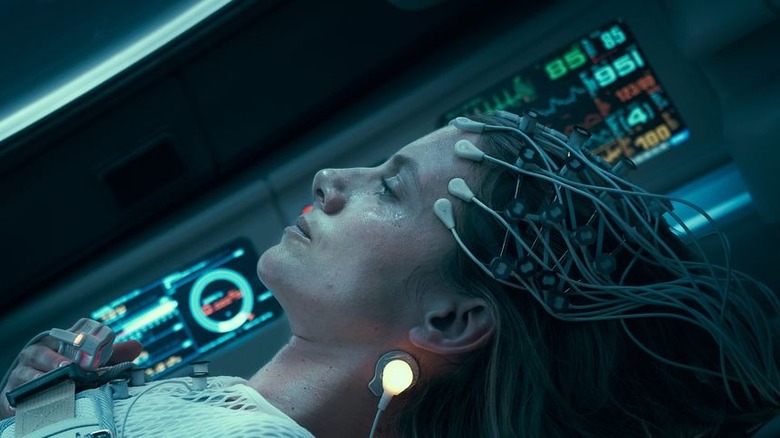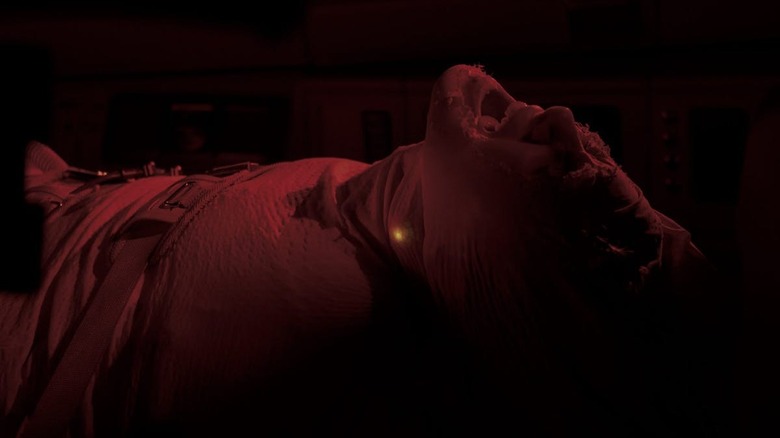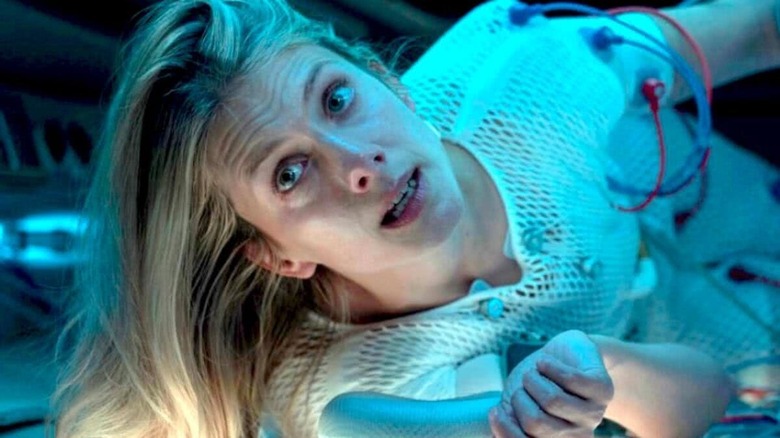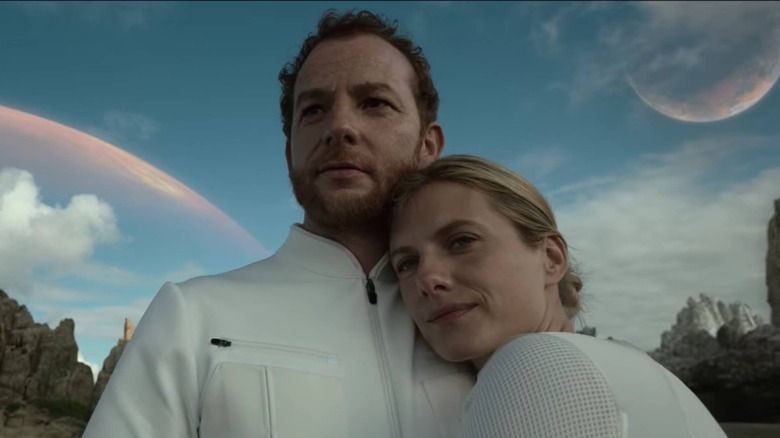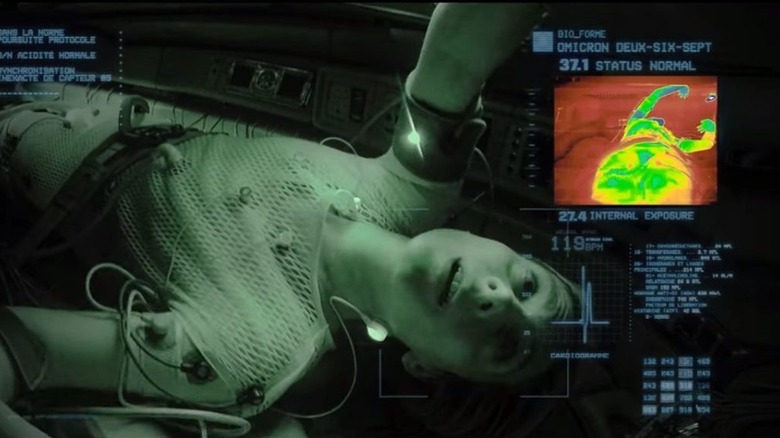The Ending Of Oxygen Explained
It's a thought experiment you probably don't want to engage with: What would you do if you were buried alive? It's a terrifying prospect that's been depicted several times in film — from "Buried" to "The Serpent and the Rainbow." Now, the idea has been given a science-fiction twist courtesy of the newest thriller to make its way to Netflix — "Oxygen."
The film, which is one of the best sci-fi flicks of 2021, follows Elizabeth (Mélanie Laurent), who finds herself trapped in some kind of medical pod with an A.I. system that won't let her escape. Her problems are further compounded by the fact she doesn't remember who she is or how she got in the pod in the first place. While she can somewhat communicate with the outside world, she comes across some devastating revelations throughout the movie.
It's the kind of film you want to go into knowing absolutely nothing about, because each twist is more shocking than the last. However, it's understandable if you get to the ending of "Oxygen" and have a few questions about what precisely you saw. Those last 15 minutes or so throw the audience for the biggest loop yet, so here's how everything plays out for Liz by the film's end.
An unforeseen event causes Liz's predicament
For the first half of the movie, we assume Liz is somewhere on Earth, until a woman over the phone who knows about Liz shows her that in actuality, she's in space. This leads to arguably the most impressive shot in the film when Liz finally tells M.I.L.O. (Mathieu Amalric) to show her what's immediately outside. She's in a massive spacecraft, and by the looks of it, she's not the only one who's had a rough day.
Other pods look damaged, and we can see other people's bodies floating in the weightless vacuum of space. With the information we're given, it's clear a meteor collided with the shuttle, resulting in hundreds of beings meeting an untimely demise. If you'll recall, Liz also had the thought to eject from her pod, but the old woman over the phone convinced her not to. It looks like not everyone else had the same level of foresight, unfortunately for them.
The moment where we see the spaceship is a nice reversal of the common "buried alive" trope, because at that moment, Liz's predicament feels all the more hopeless. No one can save her, and so many others before her have met their ends.
Liz's true identity
There's a lot of misdirection going on throughout "Oxygen." Liz believes she was married at one point, only to be told her husband never existed. Then she discovers that she was married, but that her husband died some time ago. It's all very confusing until the very end, when we discover who Liz actually is — a clone.
The movie opens with a sequence of a mouse making its way through a maze, which becomes a motif throughout the plot. Toward the end, we get an explanation of what all that means. As it turns out, humanity doesn't have long on the planet Earth, so they sent a colony to another planet that could support life. Of course, it would be pretty messed up to send actual humans on an experimental journey, so after extensive testing to clone and install memories in mice, the science community was ready to try it out on human beings. Liz, as well as everyone else on that spacecraft, is a clone destined to live a parallel life on an alien world.
Liz reaches this conclusion all on her own, which explains why the police officer she spoke with previously gave her bad information. Authorities don't want it getting out that governments sent a bunch of clones into space to inhabit another planet. Sounds like it would be pretty bad P.R.
The identity of the woman over the phone
The only person in the movie who seems to have Liz's best interest in mind is the mysterious woman over the phone she initially contacts when she's trying to reach her husband, Leo (Malik Zidi). Phone lady gives Liz all the information she needs, before some kind of law enforcement bursts into her home, apprehending her. As Liz learns more about memory transplantation, we realize that the old woman Liz spoke to is the real Liz — the one whose genetic material was used to create the clone we've been following throughout the movie.
Real-Liz's fate remains unclear. It sounds as though the government is willing to go to extreme measures to ensure word doesn't get out about Earth's fate, so it's very possible she's either been imprisoned or killed. The revelation that we've been watching a clone this entire time is an intriguing one. Clone-Liz even references this fact, stating how she's disposable, and after all, there are still hundreds of clones whose pods were undamaged from the accident. She could die, and nothing would really change in terms of humanity's future.
For a while, Clone-Liz seems to accept her fate, but she has the genetic material of a brilliant woman, so she does throw one last Hail Mary to save herself by diverting oxygen from the lost clones' pods to her own. At the last second, the gambit proves to be a success, allowing her to go back into hypersleep with a smile on her face, knowing she did it, and that she'll get the chance to see her husband (at least the clone-version of him) again.
What's going on in the final scene?
Both Liz and the audience finally get a breath of fresh air by the film's finale when we finally see characters step foot on Wolf 10-61c, the new home for humanity. Liz and her husband embrace one another as they look out toward the sea, ready to kickstart humanity and engage in a bold, new future.
After everything we've just seen as well as the numerous hallucinations that occur throughout the film while Liz is in isolation, it's natural to assume that this final scene is a figment of Liz's imagination. Given everything we've seen, and the fact that Liz's plan to divert oxygen to her pod proved workable, there's no reason to believe she wouldn't have made it the rest of the way unscathed. After 90 minutes of stressful terror, Liz can finally rest easy knowing she made it, and while she knows she's a clone, it shouldn't matter. For all intents and purposes, she is the real Liz — with all of her memories and scientific know-how. That beautiful last scene is no hallucination.
Her life's mission on Earth is finally complete. A decent collection of humans is now on a new planet, willing to have a fresh start. Hopefully, they can learn from the mistakes of the past so that they don't have to find another planet to inhabit any time soon. Seems like a lot of work.
Oxygen is about preserving optimism through grief
2020 was not a good year for most people. Between the COVID-19 pandemic and continuing political strife, many people recognized just how fragile our society can be. "Oxygen" on Netflix plays into these ideas, even referencing a virus (albeit a fictional one) that killed millions of people, Liz's real husband among them. It's hard not to think of all the catastrophic things facing humanity today, and with everyone from Jeff Bezos to Elon Musk trying to get humanity to Mars and beyond, it's possible mankind's future could be among the stars.
It may seem like a major leap, but that's ultimately the message of the film. Humans have to maintain optimism even in dark times if we're even going to overcome the challenges ahead. Yes, there were times when Liz wanted to give up, much like how there are people out there who may just want to resign themselves to the impending apocalypse. But in her darkest moments, she powers through and finds the one unique solution that will allow her to thrive and be with her love.
"Oxygen" showcases interplanetary space travel, cloning, and memory transplantation, which are all feasible scientific processes. Humanity is capable of great things, but we need to act fast. Just like Liz was quickly running out of air, civilization is running out of time to reverse course on many of the practices that will cause issues in the near future. We just have to be smart enough to find the one way out of our collective conundrum.
